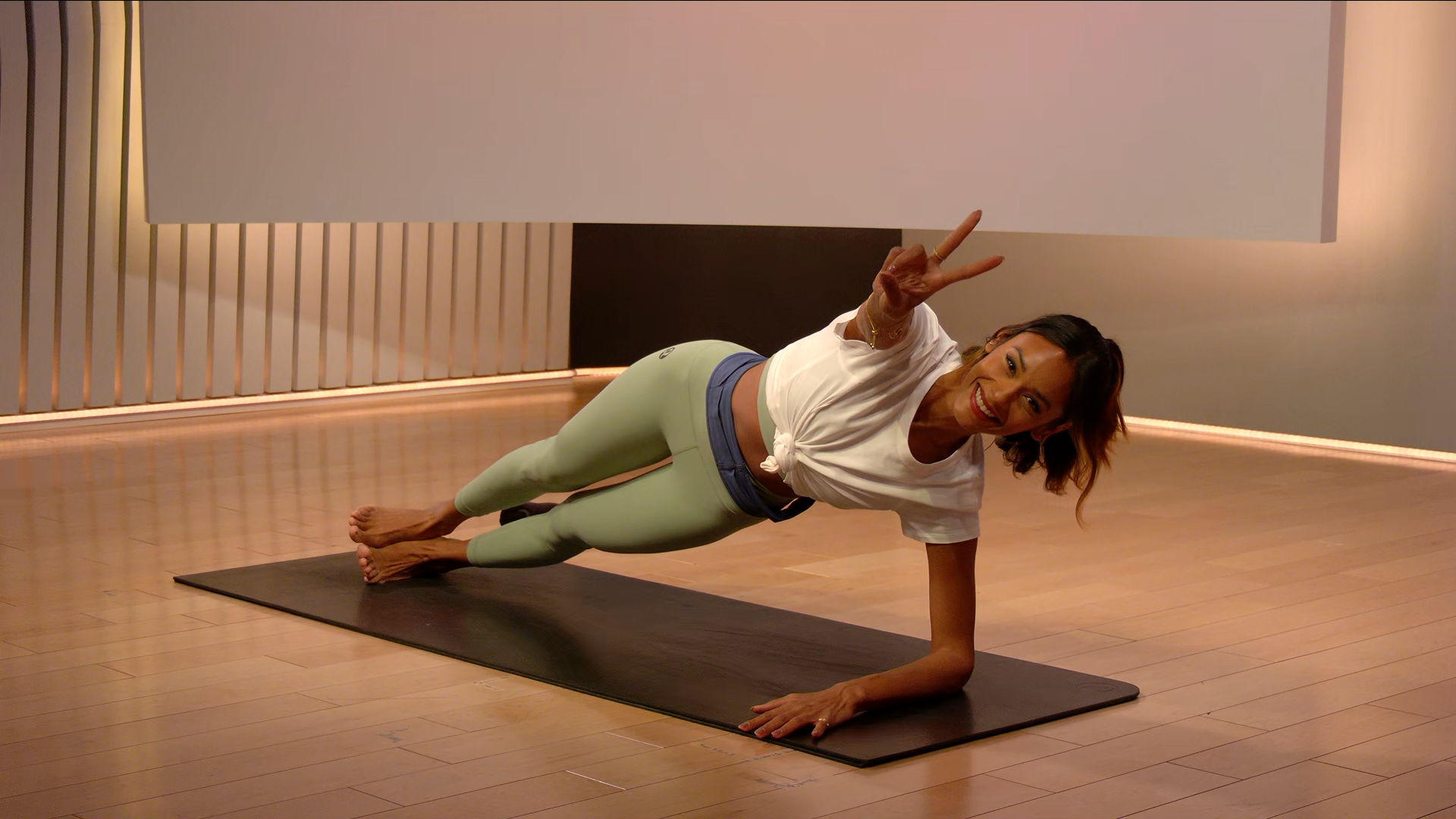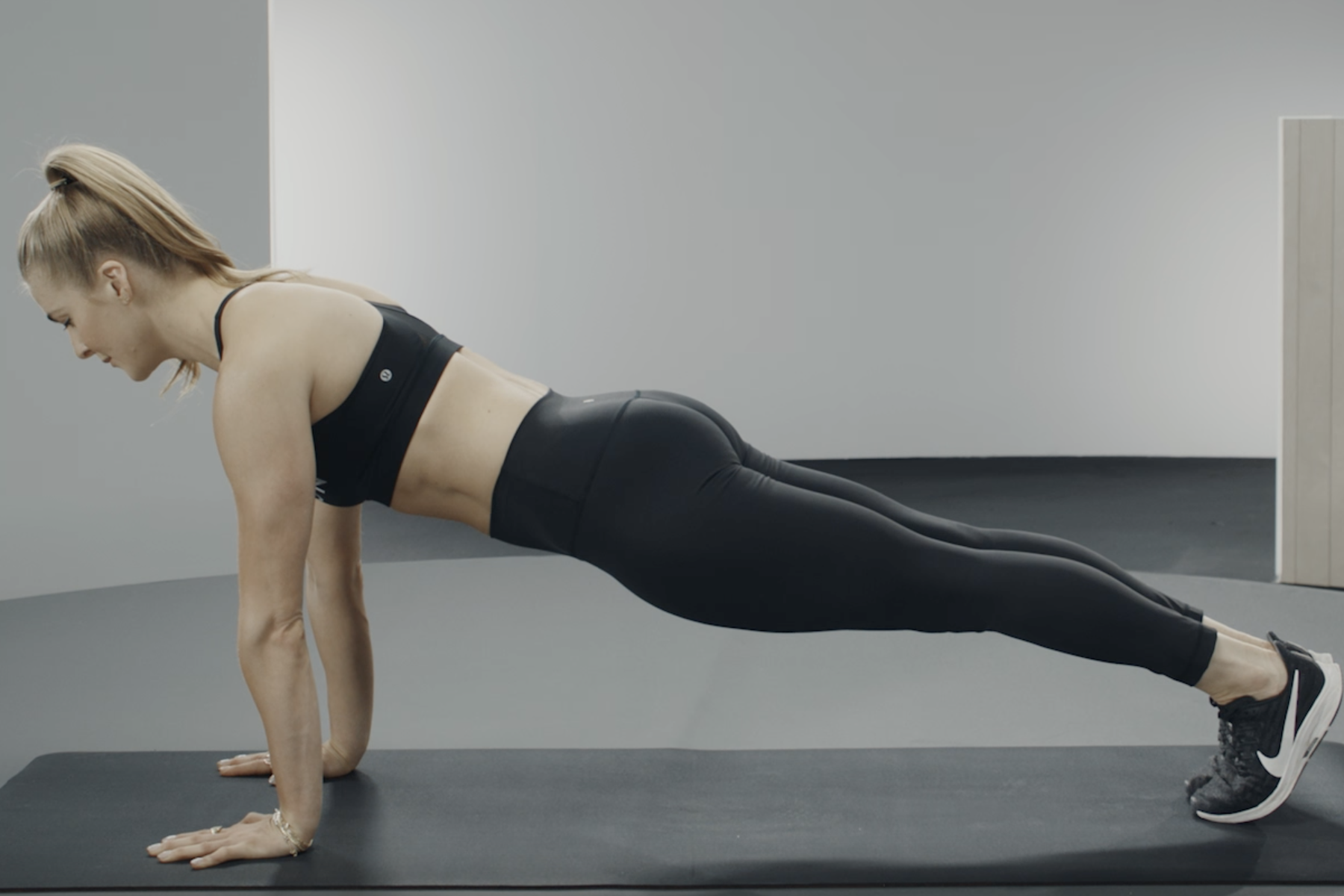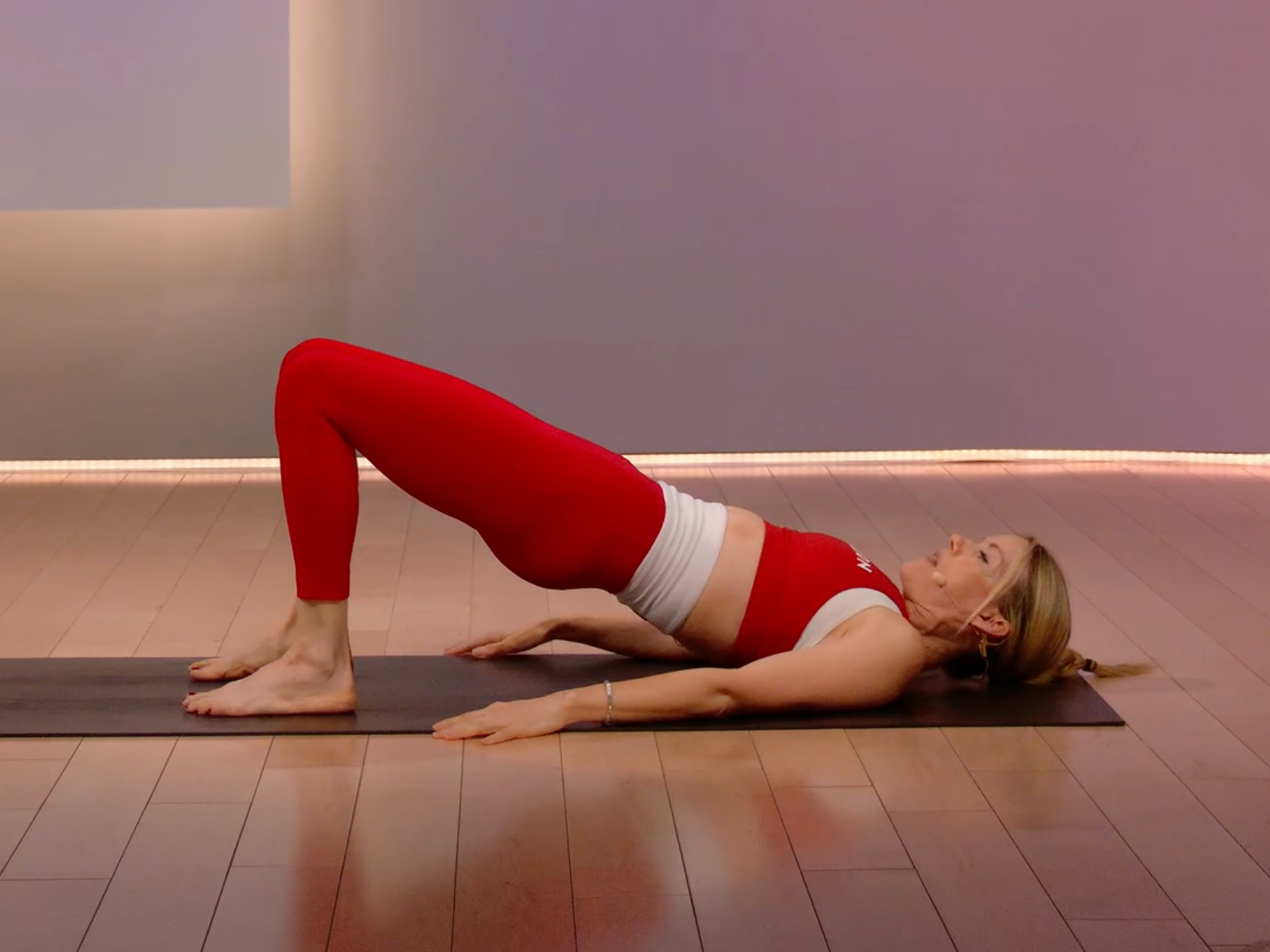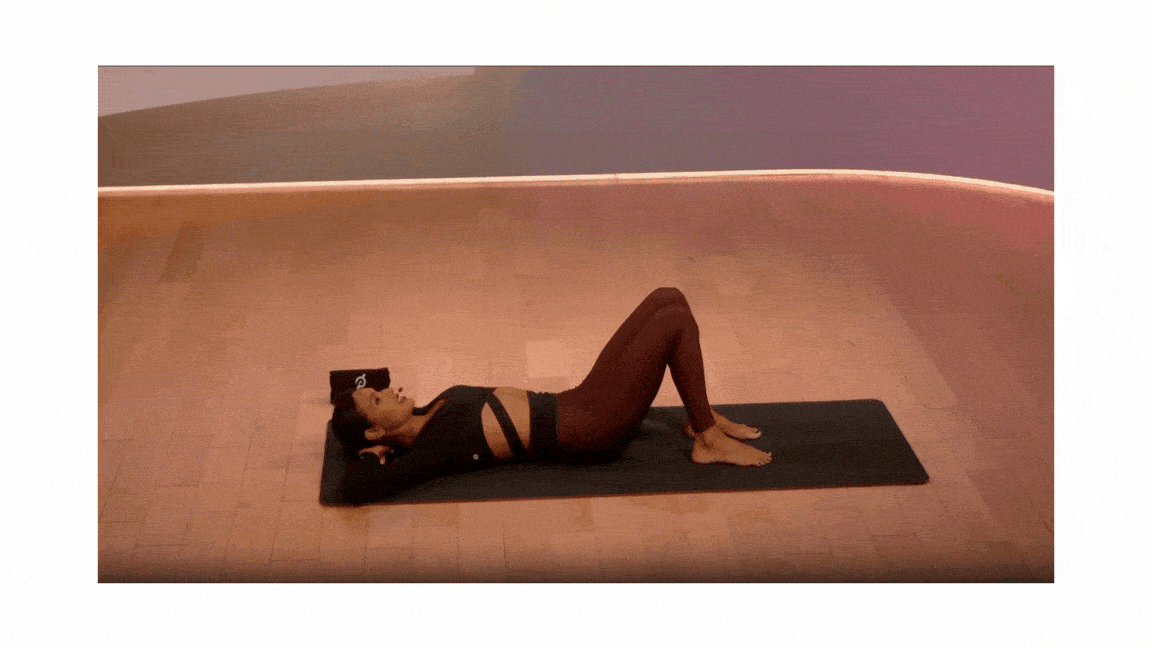
Want a Stronger Core? Try These 6 Pilates Ab Exercises
Strengthen your Pilates "powerhouse," aka your core with these key moves.
By Michele Ross•
What Is the Pilates Powerhouse?
Why Pilates Ab Exercises Are So Effective for a Strong Core
6 Pilates Ab Exercises to Try For a Strong Core
Beginner Pilates Ab Exercises to Master Before Leveling Up
The Takeaway
On a quest to build strong abs? Sure, you can do crunches until you turn blue. Enter Pilates ab exercises to help you switch things up, and enjoy the benefits including better posture and relief from lower back pain. Pilates ab exercises offer a tried-and-true way to fire up your core, aka your powerhouse.
Ahead, Peloton instructor Aditi Shah explains why Pilates is a wonderful form of movement for core strength and stability alike. Plus: a step-by-step guide to the best Pilates ab exercises for beginners and advanced practitioners.
What Is the Pilates Powerhouse?
In Pilates terms, the powerhouse refers to your core, with your core functioning as the powerhouse of your full body. “The powerhouse is a catch-all phrase for all the parts of your core, the most [important] part of your body that we work on strengthening and stabilizing,” Aditi explains.
It’s important to note that your core includes (but goes well beyond) the rectus abdominis (aka six-pack muscles) alone. As Aditi explains, your powerhouse also includes your:
Transverse abdominis (deep core)
Diaphragm
Rotators
Multifidus (core stabilizer)
Quadratus lumborum (deepest back muscle)
Why Pilates Ab Exercises Are So Effective for a Strong Core
If a strong core nears the top of your list of fitness goals, Pilates ab exercises are a surefire way to get closer to achieving it. “As far as I know, Pilates is one of the only modalities that specifically talks about and targets the powerhouse muscles,” says Aditi.
Best of all, these moves are effective enough to sculpt your abs both visually and beneath the surface, all the while extending to the other body parts that comprise your powerhouse. “Many of the exercises that exercise your abs include more than just the six-pack abs and focus on both stability and strength,” she adds.
Why a Strong Core Is Key to Your Pilates Practice
Just as Pilates ab exercises can strengthen your core, a strong core will come to your aid throughout your greater Pilates practice. Among its many claims to fame is the fact that Pilates activates your powerhouse in just about every single move—not just the ones in a Pilates ab exercise circuit.
No matter if you’re working up a sweat in a mat Pilates class, on a Reformer, or on another Pilates apparatus, your powerhouse will stay active and engaged from start to finish. The stronger your core is, the more seamlessly you’ll be able to stick to your practice while safely strengthening and stabilizing your entire body.
P.s. Building up your core strength will be beneficial for other types of exercise, too. Per a 2023 study published in the journal Behavioral Sciences, core training has a significant effect on general athletic performance, enhancing markers such as balance and core endurance in athletes.
6 Pilates Ab Exercises to Try For a Strong Core
Ahead, discover Aditi’s top picks for Pilates ab exercises that build a seriously strong powerhouse.

Lay down on your back with your lower back firmly rooted down onto the mat. Bring your legs to tabletop position. Lift your head, neck, and shoulders a few inches off the mat. Keep your chin tucked and your abs scooped in.
Hover your arms off the mat, extending towards your waist with your palms facing down.
Extend your legs to a 45-degree angle. (Elevate them more, as needed, if your lower back lifts off of the mat.)
Vigorously pump your arms up and down and inhale for a count of five followed by an exhale for a count of five through your mouth. Keep the tension out of your neck and shoulders by engaging your core throughout.
Repeat the cycle for a total of 10 rounds of breath (i.e., 100 pumps).

2. Double-Leg Toe Taps
Lay on your back with your arms to your sides. Lift your legs to a tabletop position, with your knees over your hips and shins parallel to the mat.
On the inhale, slowly lower your toes so they tap the mat, keeping the 90 degree angle in the legs. On the exhale, engage your powerhouse to bring your legs up to the starting position.
Tip: The goal during this exercise is to keep the pelvis and lower back stable by engaging the core muscles.

3. Leg Circles
Lay on your back. Place your arms by your sides and your palms facing down.
Lift your right leg toward the ceiling. Keeping your knee straight, circle your leg into the body’s center then sweep it back up in a 360-degree motion.
Continue with your desired number of reps before switching directions.
Repeat with the left leg.

4. Leg Lifts
Lay on your back. Place your arms by your sides and your palms pressed firmly onto the mat. Engage your core to raise your legs straight above your hips. (Your body will make an L-shaped position.)
Inhale as you lower your legs down, briefly holding as your heels hover about six inches above the mat. You can modify here by lowering your legs as low as you can without compromising the stability of your lower back and pelvis, adds Aditi. You can also bend the knees if that is helpful.
Exhale as you draw your belly button in towards your spine to lift your legs back up into starting position.
Note: To tone down the intensity, Aditi advises starting out with single leg lifts by keeping one knee bent and the foot rooted on the floor, or you can keep one leg in tabletop position.

5. Plank
Place your palms on the mat directly beneath your shoulders. Lengthen your legs behind you with your feet together (or separated up to hips’ width apart to help with balance) and your weight in the balls of your feet.
Maintain a long spine by keeping your neck neutral, shoulders away from your ears, pelvis slightly tucked, and glutes engaged.
Keep your core engaged and breathe evenly as you hold the plank for up to one minute.
Note: Whether you need a more accessible or more challenging modification, there’s no shortage of plank variations to choose from. For instance, you can hold a forearm plank if your wrists are in need of some TLC, or do dynamic plank shoulder taps to challenge your balance and work on upper body strength even further.

GoodLifeStudio/Getty Images
6. Side Plank
Sit on your right hip with your legs long, heels stacked, and right palm in line with your torso.
Push into the mat to lift your left hip up toward the ceiling. Keep your right shoulder over your right wrist with your chest and hips facing forward.
Hold for up to one minute then switch sides.
Beginner Pilates Ab Exercises to Master Before Leveling Up
In case you’re new to Pilates, haven’t worked out in a while, or are recovering from injury, you may want to take a slow and steady approach to focusing on your core. If the moves above aren’t accessible to you right now, consider starting with these beginner-friendly Pilates ab exercises first.

1. Glute Bridge
The Glute Bridge offers a terrific entryway to tap into your body and get more familiar with your core. “Articulating Bridges are not an ab exercise [per se], but a great way to start to feel and understand what kind of intentionality and control we can start to develop in our bodies using the powerhouse muscles,” Aditi explains.
Lay on your back with your knees bent and heels on the mat. Keep your feet hips’ width apart and your heels about one foot away from your glutes. Keep your arms to your sides and your palms facing down.
Squeeze your glutes and engage your core. Slowly lift your hips up into a straight diagonal line from your shoulders to your knees.
Hold for one breath. Lower down and return to the starting position.

2. Single-Leg Toe Taps
Aditi cites toe taps as her favorite Pilates ab exercise for beginners. “There are so many ways to modify toe taps to make them effective and accessible for everyone,” she shares. (Above, we shared the more challenging Double-Leg Toe Taps, but Single-Leg Toe Taps are more suitable for those who are just starting out.)
Lay on your back with your arms to your sides. Lift your legs to a tabletop position, with your knees over your hips and shins parallel to the mat.
On the inhale, slowly tap your right toes to the mat, maintaining a 90 degree angle in the legs. On the exhale, engage your powerhouse to bring your right leg up to the starting position.
Repeat on the opposite side.
The Takeaway
No matter if your goal is to get a stronger core, improve your posture, or help alleviate lower back pain, you really can’t go wrong by integrating Pilates ab exercises into your routine. The Pilates moves shared above—which, by the way, you can find in Aditi’s 30-minute Pilates class for core strength, flexibility, and body awareness on the Peloton App—are pretty much guaranteed to fire up your powerhouse and help you progress towards your core-specific goals.

Peloton App
Access thousands of classes with no equipment needed.
As you perform these ab exercises, always remember to move slowly and with integrity: keep your core engaged and use your breath to work through the challenges. With the right balance of effort and consistency, you can anticipate stronger abs and greater core stability.
This content is for informational and educational purposes only and does not constitute individualized advice. It is not intended to replace professional medical evaluation, diagnosis, or treatment. Seek the advice of your physician for questions you may have regarding your health or a medical condition. If you are having a medical emergency, call your physician or 911 immediately.
Level up your inbox.
Subscribe for a weekly dose of fitness, plus the latest promos, launches, and events.
By providing your email address, you agree to receive marketing communications from Peloton.
For more about how we use your information, see our Privacy Policy.






